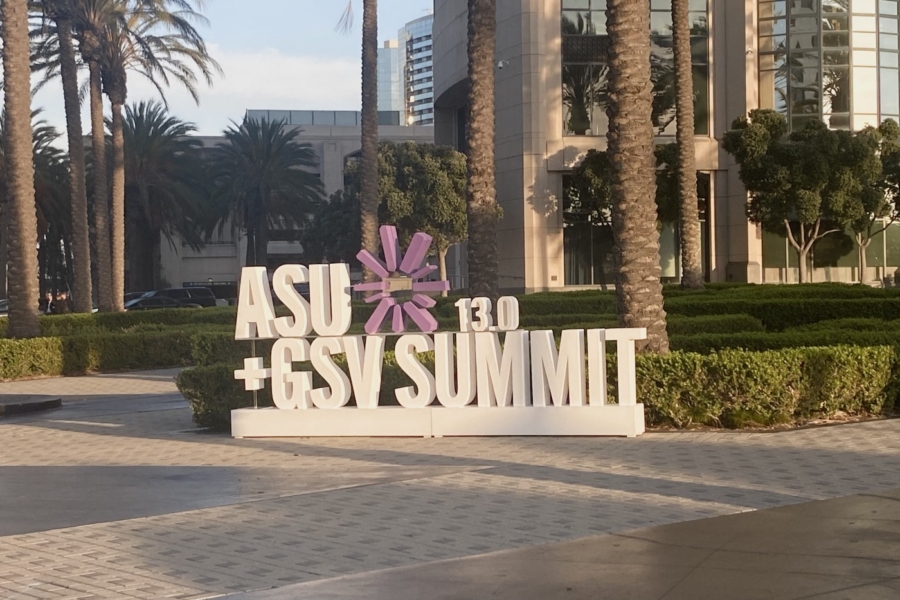I attended my first ASU GSV Summit last month, as a social media intern at Reach Capital and as a college student contemplating the rise in online learning over the past two years. Due to the pandemic, we relied on edtech tools more than ever. While the sudden transition to the online learning format had its trials and tribulations, it was apparent at the conference that these daunting challenges had only further energized people to reimagine how digital transformation can improve educational experiences and outcomes for educators and students.
When I first arrived at the summit, it was overwhelming. It constantly felt like I was hustling my way through busy crowds of people to get to the next meeting or panel. There were so many sessions to see, from speakers of different backgrounds, all united by a desire to improve learning practices, and a drive to empower our future leaders with skills and confidence they need to succeed.
One of the main lessons I took away was the importance of encouraging students to have drive and agency, instead of thoughtlessly going through the usual motions, habits and routines of school. The challenge is figuring out how to leverage technology to make information, connections and opportunities accessible to every student and empower them to be in the driver’s seat of their learning journey. To revolutionize how we not just consume content but also apply it towards creating something tangible that will have a lasting impact, such as a website, portfolio, research report, presentation, design and more. Even a company.
The summit also addressed many challenges adjacent to edtech that could stifle innovation, including the climate crisis and mental health issues. Regarding the latter, I, along with many of my peers and educators, have experienced fatigue from prolonged screen time and social isolation over the past couple years. Instead of forging new connections and relationships, we spent much of our college years to date in Zoom classes and breakout rooms where half the attendees are off camera and on mute. That’s not going to cut it. With anxiety and depression rates growing, there is an urgent need to ensure that technology does not further de-humanize relationships and reinforce our loneliness. Remember: we aren’t just colorful pixels reflecting off a screen, but that human beings with purpose to be cultivated.
I attended many panels over the first two days of the summit that discussed pressing issues affecting early childhood, K-12, higher education, and vocational schools, usually pertaining to the 3 A’s: affordability, accessibility, and accreditation. I also saw talks on other topics that I was unfamiliar with. For example, I found the term “web3” to be intimidating, often too complex to break down into simpler bites to understand how this emerging technology can unlock new possibilities. What interested me was its potential to embrace a multitude of different systems that could improve educational opportunities and economic mobility (learn-to-earn, competency-based education) tailored to students’ needs and give them more ownership over their learning journey. After the session, I read Reach Partner Jomayra Herrera’s overview of the space, subscribed to some newsletters, and curated a list of helpful readings on the topic.
One panel spoke directly to my personal experiences: “Invigorating the Youth Force Through Mentorships and Social Capital,” which emphasized the importance of acquiring relevant knowledge and developing skill sets through work experiences and extracurricular internships. I had the privilege of attending a project-based learning school growing up, and had the opportunity to experience firsthand the importance of establishing connections and pursuing rewarding experiences in my career field of interest. For me, the key components of successful internships have been through learning from the wisdom of mentors and being scrappy and pursuing ambiguous project work.
These experiences instilled a sense of confidence in my abilities, and passion blossomed as a result. For young people and Gen Z like myself, being given an opportunity allows for leverage, taking form in expanding one’s network, figuring out the best strategies for communicating and collaborating effectively, and gaining some new skills and work experience in preparation for the next great thing.
Hence, this is why my first ASU GSV Summit was so meaningful — to interact with the people who are building the ideas that I’ve been following, and which shape my educational experiences. Many thanks to the Reach Capital team for offering me the amazing opportunity to attend this summit.

